Driving the fairness agenda
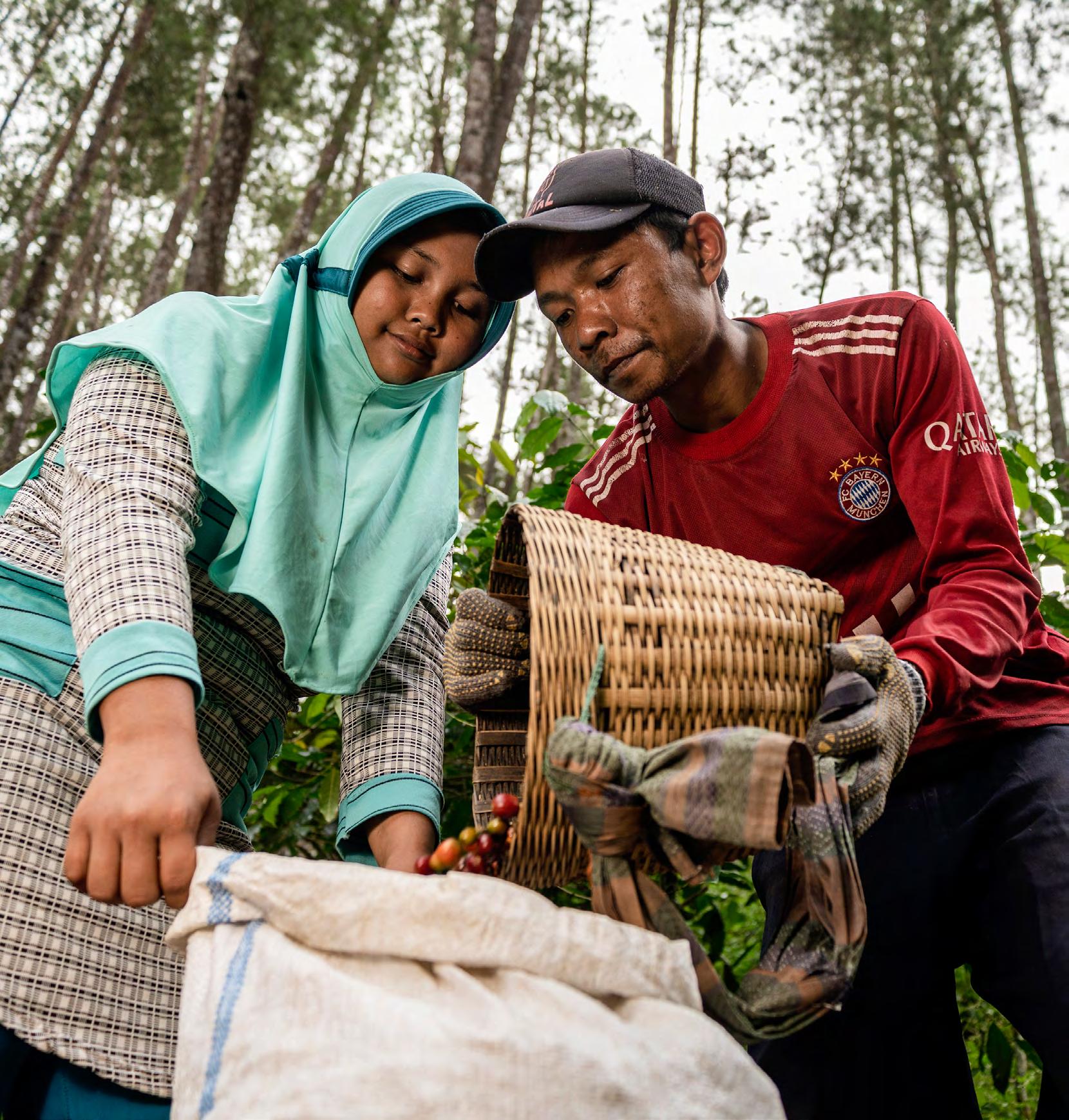
FAIRTRADE INTERNATIONAL ANNUAL REPORT 2023
Cover photo: Meri Kusumawati works with her husband Amang to collect the coffee cherry from their farm in East Java, Indonesia. They are members of cooperative KSU Surya Abadi Kayumas.
Photo below: Yosvany Finalet González is a member of Fairtrade certified sugar cane cooperative UBPC Pita in Cuba. The cooperative bought a stateof-the-art tractor with Fairtrade Premium funds to reduce field labour in clearing the land.
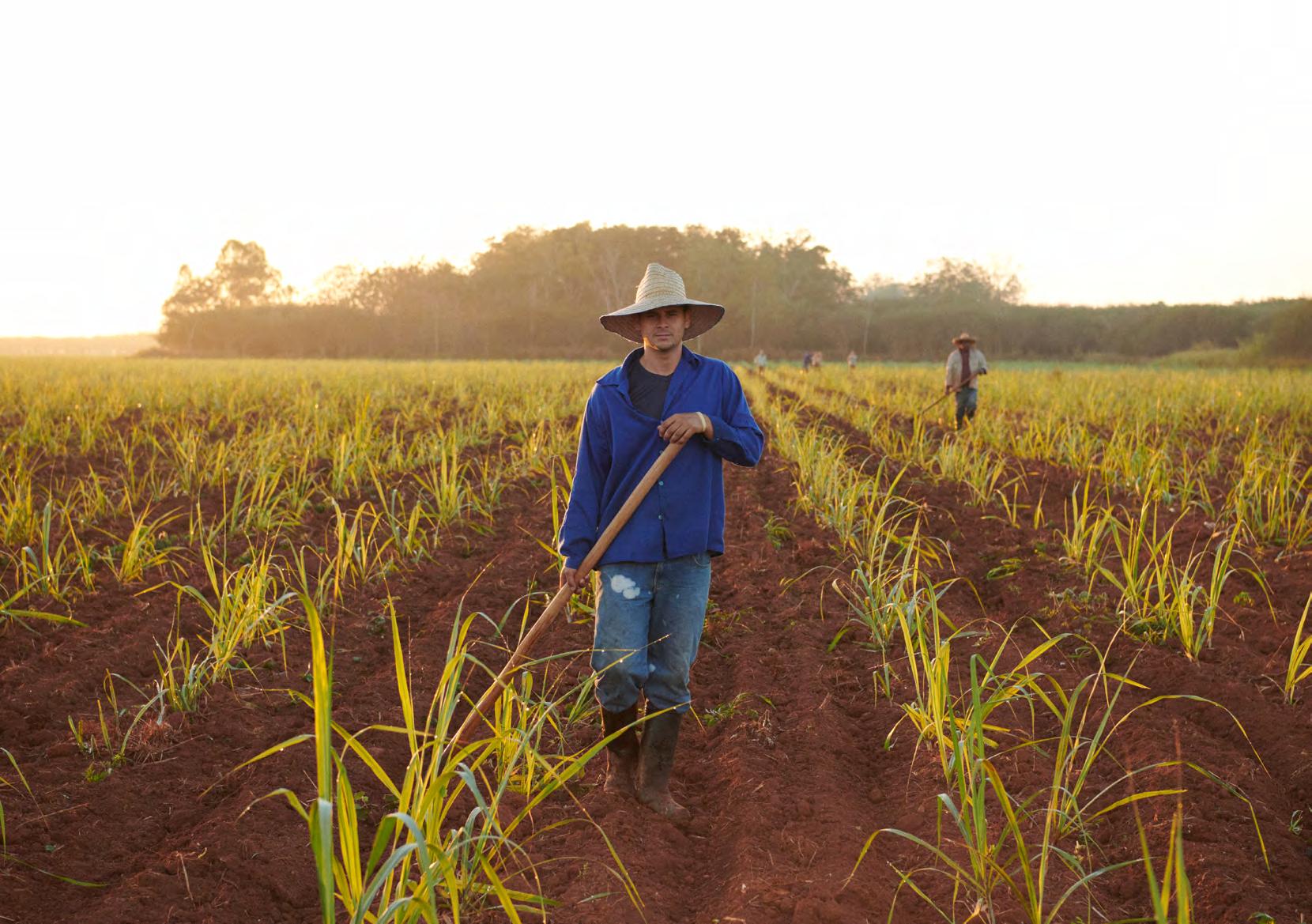
Table of Contents 3 Foreword 4 Key Fairtrade figures at a glance 5 Fairtrade’s global strategy 6 Stronger together: our global network 7 Shifting the balance of power to farmers and workers • Living incomes • Decent work and living wages • Climate resilience and environmental protection • Human rights and environmental due diligence • Opportunities for women and young people 13 Growth and innovation 16 Advocacy and citizen engagement 18 Digitalisation for fairer supply chains 19 Partnerships that drive impact 20 Fairtrade International’s financials 22 Fairtrade International Board of Directors
Watch
Foreword
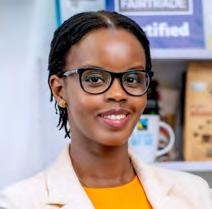

We are pleased to present Fairtrade International’s annual report for 2023, on behalf of Fairtrade International’s Executive Management.
We are living in a rapidly changing world. Whether it’s related to climate, conflict, cost of living, or new regulations, we are all being called on to adapt and to act. Initiatives that are supposed to protect people and planet – for instance, a focus on deforestation and human rights – have good intentions, but often lead to more burden and expense for farmers and workers –simply to maintain market access. Amidst all the crises and well-intentioned initiatives, there is an increasing call for collective action from all our stakeholders –businesses, producers, policymakers and consumers – to drive solutions together. This has been at the heart of our work over the past 12 months.
In 2023, we conducted a mid-term review of our 2021-2025 global strategy. We’re on track in many areas, including in updating important elements of our Standards and prices; successful advocacy on European legislation that affects Fairtrade farmers and workers; and expanding our work and partnerships related to increasing market access, living incomes, forest protection, and climate change resilience.
Especially when it comes to complying with new regulations on deforestation and corporate sustainability due diligence, it is essential that companies share the responsibility to achieve these common goals with producers and that the tools and data flow are in place as enablers. This is why data, digitalisation and access to information for both producers and businesses continue to be a high priority, for instance in traceability within supply chains, and measuring and publicly sharing impact data, such as in our recent banana dashboard.
With Fairtrade’s global market share in the single digits for our three core products (coffee, cocoa and bananas), there is plenty of room for growth – growth that would represent benefits for people and planet, and expansion of a fairer way of doing business.
So one of our areas of focus through 2025 is continuing to explore ways of generating more sales for producers, and deepening impact. We are developing services that support companies and producers to make progress on sustainability goals, such as bringing innovative sustainability solutions into our pathway to living wages for banana workers, through which companies can make sure they are contributing their fair share and that workers are actually earning living wages. We published a core component of this pathway – our first-of-its-kind Living Wage Reference Prices for four banana-producing countries – so that the entire industry can work to close the gap to living wages that workers urgently need. We congratulate our commercial partners who are taking up this challenge and commitment. This shared collective responsibility is a clear example of what can be done if we embed fair practices into our business and policy making processes. Another example is the launch of our new services to reinforce companies’ human rights and environmental due diligence processes in their supply chains.
We are also innovating new ways to develop Fairtrade finished products so that producers can sell more on Fairtrade terms, from value addition for exported products, to producers marketing Fairtrade products locally, and more.
Our work together with producers and partners on tailored capacity strengthening at the farm and business operations level increasingly focuses on the requirements needed for the highly interconnected issues of for human rights, living incomes, sustainable consumption, and a promising future for the next generation of farmers.
We thank everyone who has made possible the milestones outlined in these pages – and invite many more to join us to drive more results together.
Sandra Uwera Murasa Global CEO Fairtrade International
Melissa Duncan Executive Director Fairtrade International
3 Annual Report 2023
Fairtrade Living Wage Reference Prices set for banana origins: Colombia, Dominican Republic, Ecuador, Peru studies and reports published 2 8
Fairtrade Living Income Reference Prices available, across products and countries 12 11 commodities featured on the Fairtrade Risk Map for human rights and environmental due diligence 8 new HREDD guidance documents for traders and producers published 3 externally funded projects active in 2023 56 new Fairtrade Minimum Price for Arabica coffee per pound, updated in 2023 $1.80
Fairtrade Standards and prices updated 8+
Fairtrade Child Labour and Forced Labour Prevention and Remediation Programme launched with €450K
Fairtrade ambassadors and other experts spoke at sessions at COP28 global climate change conference Fairtrade coffee and cocoa cooperatives can access deforestation risk monitoring through Satelligence partnership 950+
Fairtrade International 4 For more information visit our website: www.fairtrade.net Key Fairtrade figures
at a glance
Fairtrade’s global strategy
Our strategic priorities guide our actions as individual organisations and as a system.
Fairtrade global strategic priorities for 20212025 are covered in this report:
1. Shifting the balance of power to farmers and workers
3. Advocacy and citizen engagement
Launchpad for the future
2. Growth and innovation
4. Digitalisation for fairer supply chains
The Fairtrade system is made up of more than 25 organisations, 1,000 staff and more than two million farmers and workers, from 100 countries around the globe. Our fifth strategic priority focuses on increasing our innovation, partnerships and efficiency as a system. It’s a cross-cutting priority, weaving through the other areas showcased in this report.
The Fairtrade system
5 Annual Report 2023
Brands and retailers Manufacturer Exporter / importer Regional markets Producers Supply chain Licensing of the FAIRTRADE Mark, commercial services, raising awareness Fairtrade Standards development, governance, coordination Producer representation and support Local Fairtrade Organisations Fairtrade International Producer Networks Organisation
Consumers Audits and certification by FLOCERT 3 25
Stronger together: our global network
In a sea of certification schemes, here are just a few things that make Fairtrade different:
• Farmers and workers are represented at Fairtrade through three regional producer networks. As members of Fairtrade International, producer networks have a 50 percent vote in the General Assembly, our highest decision-making body.
• We set Fairtrade Minimum Prices for major commodities, with a mandatory Fairtrade Premium paid on top, which producers decide how to invest in their businesses and communities.
• We are paving the way in fair and sustainable approaches to achieving living incomes and wages, supporting human rights and environmental due diligence, building climate resilience, and more.
• The Fairtrade system, representing more than 25 Fairtrade organisations and two million farmers
and workers, joins with partners and citizens to raise awareness and advocate for fairer and more sustainable global trade.
Supporting stronger producers
Fairtrade’s three producer networks provide services to more than 1,900 producer organisations across 68 countries. Strong, democratic and resilient organisations can better serve farmer members and employees, and grow as innovators and sustainability champions.
Producer networks conduct trainings on the Fairtrade Standards and in key areas such as gender and child rights, good agroecological practices, value addition to products, governance best practices, and much more. They also deliver custom programmes and projects in partnership with governmental or corporate financial support. Many of these initiatives are described in this report.
Fairtrade International 6
Local Fairtrade organisation country Fairtrade producer country Fairtrade producer networks 259,915 farmers and workers 13% of total Asia and Pacific (NAPP) Latin America and Caribbean (CLAC) 340,206 farmers and workers 16% of total Fairtrade Africa 1,445,265 farmers and workers 71% of total
1. Shifting the balance of power to farmers and workers
Our ambition: We will secure decent and sustainable livelihoods, build resilience to climate change, and support women and young people as leaders of the future.
Living incomes
Influencing policy and practice
In 2023, we worked on multiple fronts to advance understanding and momentum toward living incomes. In May, Fairtrade Africa and Fairtrade International organized the first producerled industry summit on living incomes for cocoa farmers, held in Abidjan, Côte d’Ivoire. More than 100 participants took part in this one-day event, with about half being farmers or representing cooperatives, while the remainder came from business, government, civil society organisations and academics. The result? A joint declaration calling for sustainable procurement practices and policies that support living incomes and enforcement of laws to protect people and the environment.
We also joined with chocolate companies Tony’s Chocolonely and Jokolade, the retailer Aldi, and sustainable trade initiative IDH to publish a joint statement sharing evidence of the combined elements that work together to improve farmers’ incomes in specific supply chains. These include long-term commitments between buyers and producers, which Fairtrade Standards have long promoted, and paying a fairer price to farmers.
2023 highlights:
Expanding living incomesupporting prices
Living Income Reference Prices are what a farmer needs to earn to support a decent standard of living, based on local costs and assuming sustainable productivity level is reached. With the addition of three coffee Living Income Reference Prices for Ethiopia, Peru and Nicaragua, we ended 2023 with 12 generic reference prices available, in four products and across 11 countries. We also initiated the review of the current reference prices for Ivorian and Ghanaian cocoa.
These prices are now recognised as industry standards and can be paid voluntarily by any commercial buyer. The potential is significant: the countries and products covered by our reference prices represent more than 758,000 Fairtrade farmers.
We have also developed supply-chain specific reference prices on demand for companies and their supplying cooperatives for a range of products and origins, including cashews, oranges for juice, robusta coffee and fine flavour cocoa.
• Held first producer led living income summit in Abidjan, Côte d’Ivoire in May
• Released a new coffee Living Income Reference Price for Ethiopia, finalised prices for Peru and Nicaragua
• Results from cocoa living income projects showed that farmers earned up to 22 percent more on their cocoa sold at a Living Income Reference Price
Promising results from living income pilot projects
In our 2023 Living Income Progress Report, we shared the results of a project with two major brands – Tony’s Open Chain and Ben & Jerry’s – that were paying the reference price and also investing in other aspects necessary for living incomes. These actions included support to diversify incomes, subsidised farm inputs, and innovations like subsidised “labour brigades” of trained young adults who helped with pruning and other good practices.
Together we analysed farm data collected by 1,200 households in six Fairtrade Ivorian cocoa cooperatives over a period of two years. On average, the households sold almost half of their cocoa at the Living Income Reference Price, and earned 22 percent more from their cocoa sales overall. Per kilo sold at the Living Income Reference Price, farmers received on average 63 percent on top of the farmgate price when factoring in extra cash and in-kind income. In the second year, 18 percent of the participating farmers were earning at or above a living income.
We know how to promote good farming practices. We know how to encourage farmers to work on income diversification. But how can we better pay producers? That is the elephant in the room!”
Alex Assanvo, Executive Secretary of the Côte d’Ivoire and Ghana Cocoa Initiative, at the Abidjan living income summit in 2023
7 Annual Report 2023

Decent work and living wages
An integrated approach to living wages
Our pathway to living wages for banana workers, launched in October 2023, integrates new components to our previous framework, so that companies and producers can work transparently together to close living wage gaps.
Three elements now connect seamlessly:
Fairtrade base wage – all certified Fairtrade banana plantations are required to pay at least 70 percent of the living wage benchmark to all workers. This is supported through payment of the Fairtrade Minimum Price.
• Fairtrade Premium – up to 30 percent of Premium funds, controlled by a workers’ committee, are earmarked as a cash top-up for workers.
• NEW: Fairtrade Living Wage Differential – this is the remainder needed to close the gap to the relevant living wage benchmark.
To factor the Living Wage Differential into the price for a box of bananas, we set the first-ever Living Wage Reference Prices for bananas in four major origin countries: Colombia, Dominican Republic, Ecuador, and Peru (organic only). These prices are voluntary, set per-box, and factor in the contributions above to reach living wages for workers in proportion to the volumes bought by a commercial partner. With wage gaps and payments to workers checked by FLOCERT, companies can have transparency into what they are paying and the impact on wages through a customised dashboard.
UK retailer Sainsbury’s was the first to commit to paying the Living Wage Reference Price for its bananas.
Strengthening trade unions for flower and wine grape workers
Funded projects are making a difference in specific sectors. The Ministry of Foreign Affairs of Finland is supporting Fairtrade Finland’s Dignified Opportunities Nurtured through Trade and Sustainability (DONUTS) programme, which includes several projects related to workers’ rights. In Ethiopia, one project is supporting trade unions operating on seven Fairtrade certified flower farms to achieve sectoral collective bargaining agreements, and to become more democratic and inclusive. To date, six out of the seven organisations have gender, youth and disability inclusion policies, and three-quarters have effective grievance mechanisms. Another project in South Africa aims to create better collective bargaining agreements, increase dialogue with rightsholders, and improve relationships between trade unions and management on 26 wine grape farms with 28,000 workers in the Western Cape Province.
Study: Impact of Fairtrade on flower workers and market access of flower farms in East Africa
2023 highlights:
• Launched first ever Living Wage Reference Price and Differential for Fairtrade bananas
• Projects with South African wine workers and Ethiopian flower workers are strengthening trade unions, inclusion, and collective bargaining agreements
Published in February 2023, this study found that Fairtrade flowers workers in Kenya, Ethiopia and Uganda experience higher wages, better working conditions, more effective educational support, and greater engagement in workers’ rights issues and gender equity than their non Fairtrade certified counterparts. Recommendations included continuing to work toward living wages, strengthening unions, and requiring stronger environmental management plans.
Fairtrade International 8
Doraine Pacheco prepares bananas for packing at Fairtrade certified BANAFRUCOOP in northern Colombia.
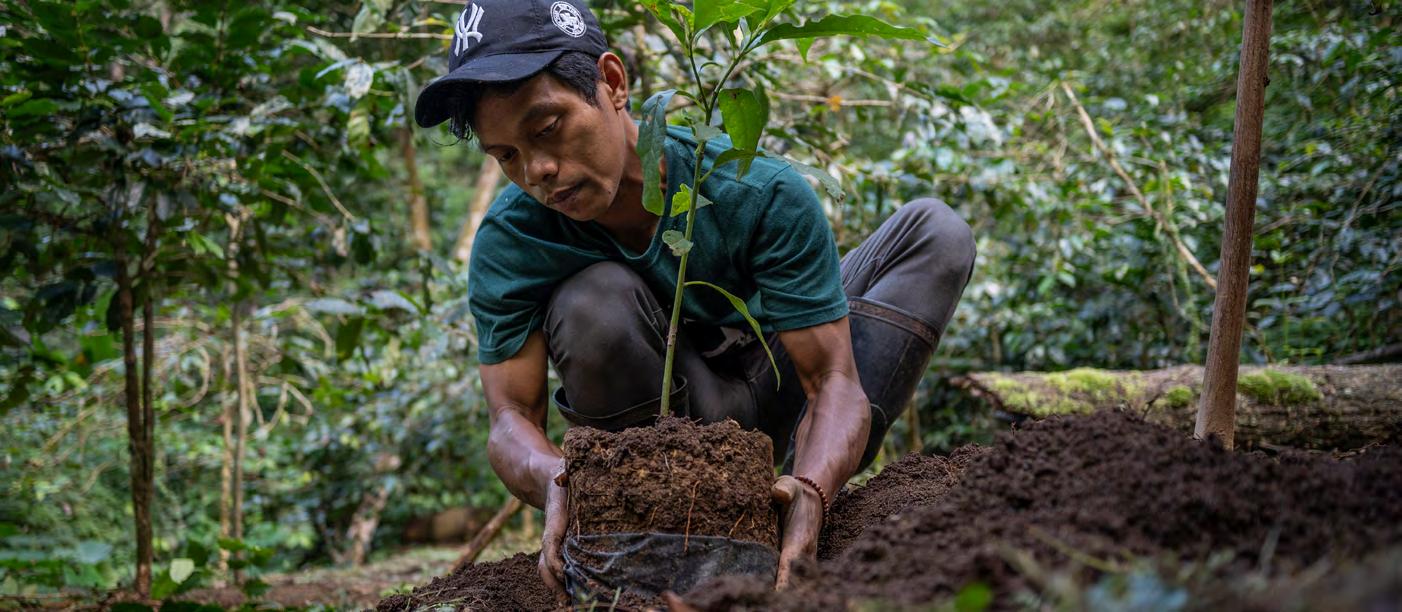
Climate resilience and environmental protection
A new sustainable agriculture policy
Our new policy, launched in July, is intended to guide our actions toward a truly sustainable global food system and focuses on agroecology. This concept encompasses the ecological, social and economic dimensions of our food systems, reflecting our founding ethos and touching on elements from climate change, to land stewardship, to food security, to incomes, to a future for young people in farming.
Advancing climate resilience through planning, training and support
Key results in 2023 include:
• Around 38 percent of all Fairtrade certified producer organisations (720 organisations) are adopting climate adaptation plans, and 32 percent (610) are reporting implementation of environmental risk mitigation
• Seven new climate projects were launched, and three strategic partnerships. Visit our impact map to find related projects: https://impactmap.fairtrade.net
• We made progress in developing a Fairtrade service prototype for carbon footprinting, based on learnings from 20 carbon footprint studies conducted over the past four years.
• As of 2023, 1,134 producer organisations (60 percent) have been trained on Good Agroecological Practices.
Having learned agroforestry practices, Adhany Ilham of Fairtrade coffee cooperative KSU Surya Abadi Kayumas in Indonesia plants an avocado seedling on his land.
• Between 2020 and 2023, the first phase of the Climate Change and Organisational Strengthening Programme built the resilience of cocoa farming households across nine unions of cocoa cooperatives in Ghana. The programme was implemented by the Fairtrade Foundation and Fairtrade Africa, with funding by Mondelēz International. More than 1,570 farmers were trained on climate-smart agricultural practices in relation to soil fertility and pest and disease management, and 259 communities developed climate adaptation action plans to reduce vulnerability to climate change, including projects such as adoption of dynamic agroforestry.
Forest protection
We also made significant progress in strengthening forest protection and supporting producers to prepare for compliance with the European Union Deforestation Regulation (EUDR), which takes effect at the end of 2024.
We have updated our product-specific standards for cocoa and coffee to align with the EUDR. Uniquely, our standards also require Fairtrade traders to
2023 highlights:
support producer organisations with their deforestation prevention efforts, so that the burden of compliance does not fall on farmers alone.
Following a pilot project in 2022, our new partnership with Satelligence seeks to support more than 950 Fairtrade coffee and cocoa producer organisations representing more than one million farmers to meet the risk assessment and verification requirements of the EUDR – free of charge to producers. Producer organisations can provide geolocation data for each of their members’ farm plots, and the Satelligence platform analyses it for deforestation activity or risk, supporting producer organisations’ risk assessments and generating a report they can share with their buyers.
Farmers speak up for a fair approach to global climate resilience
Fairtrade became an active member of the Climate Action Network (CAN) Europe and the Farmers’ Constituency in 2023, to amplify calls for climate justice and social justice.
Visit the Advocacy section of this report for more on our policy work.
• Launched our sustainable agriculture policy
• Continued aligning key Fairtrade Standards with European deforestation regulation
• Began a new partnership with Satelligence to provide deforestation risk information to coffee and cocoa producers
9 Annual Report 2023
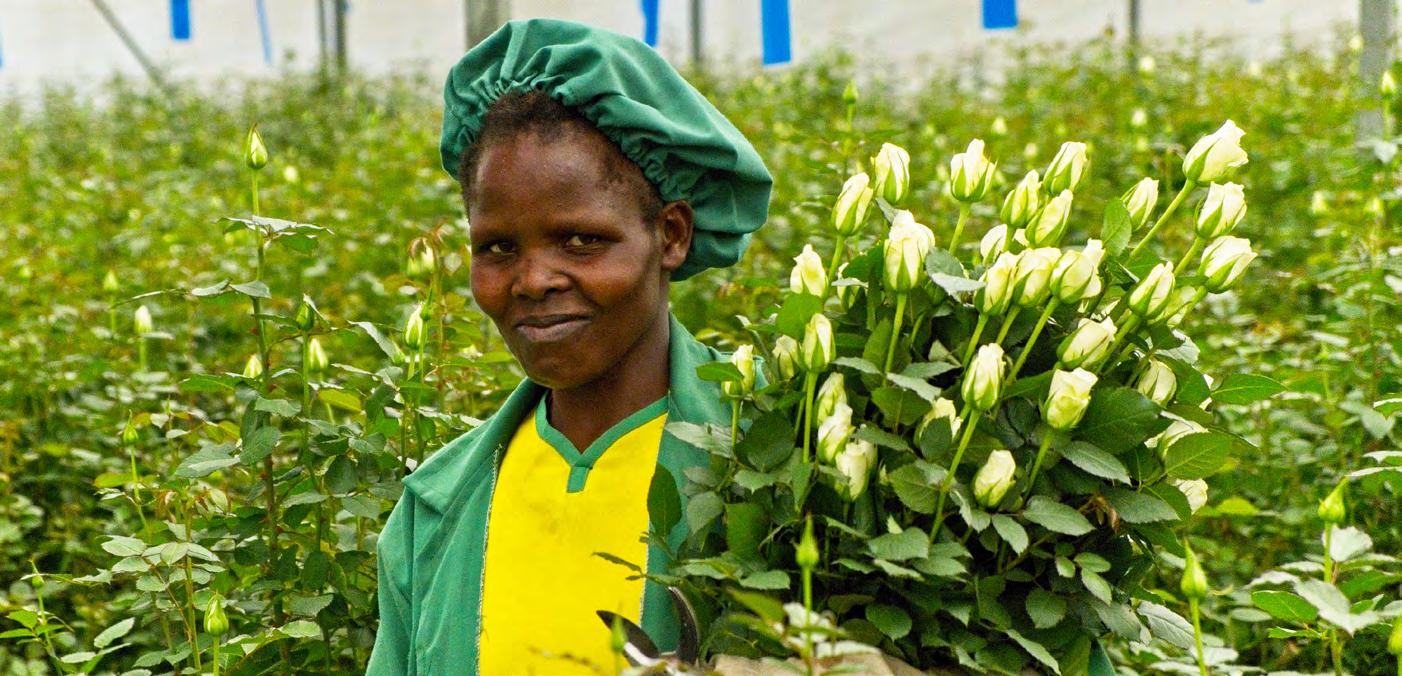
Human rights environmentalanddue diligence
Fairtrade’s due diligence services
In 2023, we defined the services we can provide to support companies with their human rights and environmental due diligence (HREDD) processes: overall HREDD advisory services, risk assessment advisory services, tailored risk reports, and prevention and mitigation plans. These services complement Fairtrade’s holistic approach, which includes incorporating due diligence principles into the Fairtrade Standards, fair pricing mechanisms, dialogue with rightsholders, providing risk information via our risk map), advocacy, and much more. We can support companies at any step of their due diligence process.
We also work with companies on customised supply chain projects. One example is a project with two cocoa cooperatives in Sierra Leone to conduct human rights risk analyses and rightsholder engagement, combined with activities to tackle these risks, especially related to deforestation and improving incomes. The project is a cooperation between the Due Diligence Fund of the German International Cooperation Agency GIZ, on behalf of the German Federal Ministry for Economic Cooperation and Development, alongside German drugstore brand dm and Swiss chocolate manufacturer Maestrani.
Linah Chepkurui is a flower packer on Kongoni River Farm LtdLongonot Division in Kenya. “Fairtrade projects improve not only our working conditions, but also our life outside the farm.”
Reporting on Fairtrade’s human rights and environmental progress
Fairtrade International’s first human rights and environmental due diligence (HREDD) report, published in December, features aggregated audit data on issues such as labour rights, child protection, and biodiversity. As the first of its kind for a sustainability certification, the report also describes Fairtrade’s HREDD process, drawing attention to poverty and inequality as underlying causes of persistent human rights and environmental harms and the need for collective action.
Because audits can only provide a snapshot and are no substitute for HREDD, the report aims to contribute to discussions on the role of multi-stakeholder initiatives, and make the case for companies to invest long-term and address root causes rather than “cut and run” from higher-risk origins.
Digital map spotlights key risks in global commodities
Launched in January 2023, the Fairtrade Risk Map (https://riskmap.fairtrade.net) shows the greatest human rights and environmental risks in the sectors where we are active. Users can also explore the root causes of these risks –such as poverty, inequality, and exploitation – and how Fairtrade prevents and mitigates them. Currently, eight commodities or areas are covered: bananas, cocoa, coffee, cotton, honey, sugar cane, wine grapes, and carbon credits. Nine more products will be added.
New resources for producers and businesses on HREDD
HREDD regulations are complicated, especially for producers and small businesses. Adding to our guide for farmer cooperatives, in 2023 we published three more guides with practical advice: for traders, large farms (plantations), and small and micro enterprises (in partnership with B Lab). We also published spreadsheet tools for cooperatives and plantations to conduct risk assessments.
2023 highlights:
• Defined Fairtrade’s services to support company due diligence
• Published firstever Fairtrade Due Diligence Report
• Launched the digital Fairtrade Risk Map of human rights and environmental risks across various sectors – and how Fairtrade mitigates them
• Released three new guides on HREDD and two risk assessment tools
Fairtrade International 10
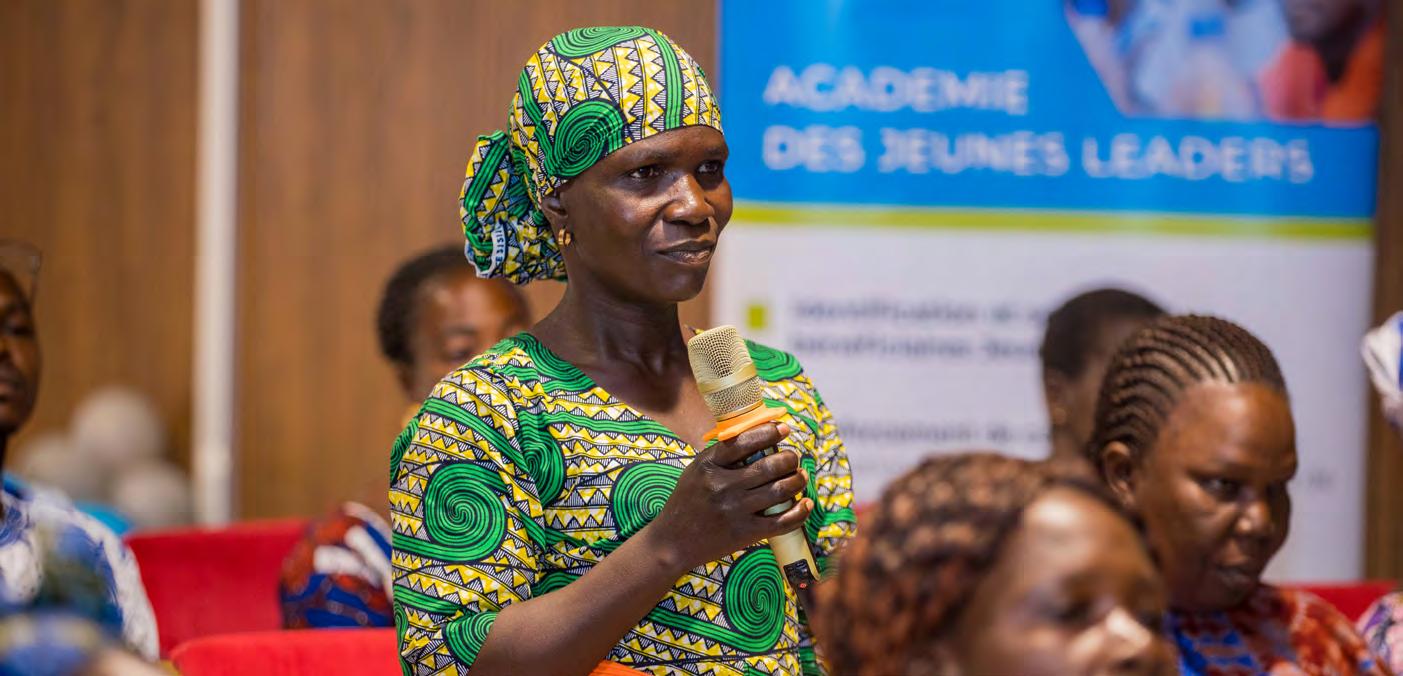
Opportunities for women and young people
The inclusion of women and young people is an essential component of sustainable, thriving farming communities. From developing new economic opportunities, to the governance of cooperatives, to earning promotions in the workplace, to community leadership and household decision making, everyone does better when women and young people have power and opportunity.
Here are a few 2023 highlights.
• Fairtrade Africa graduated the first cohort of cocoa farmers from their women’s school of leadership in Ghana, following the success of the school in Côte d’Ivoire, and launched the young cooperative managers academy, thanks to funding from the Norwegian Agency for Development Cooperation (NORAD). Seventy-nine cocoa producer organisations in Côte d’Ivoire and Ghana took part. The project has doubled the number of women and youth participating in decision making in the participating producer organisations. Nine out of ten graduates have initiated an economic or social activity so far.
• Another NORAD-funded project with Fairtrade flower producers in Kenya is addressing women’s rights and opportunities. The producer organisations have strengthened their sexual harassment policies, and 58 percent have adopted at least
A participant speaks at the graduation ceremony for the Women’s School of Leadership and Young Cooperative Managers Academy in Côte d’Ivoire.
one new practice to benefit women. Forty-three women and 18 men are being trained through a women’s school of leadership, and 281 workers are participating in new gender committees. Women are being mentored for leadership positions and appointed to traditionally male-dominated jobs, such as drivers and store supervisors.
• The Café Mujer Ubiriki project in Peru worked with 120 women coffee farmers in Peru to increase their productivity and income, build resilience to climate change, and improve women’s participation in their cooperative’s decision-making processes. Funded by German retailer REWE, the project supported the participants to share their learnings and leadership within the rest of the 500-member cooperative.
Funding from the European Commission FPA grant, which wrapped up in 2023, supported all three Fairtrade producer networks to train young leaders and develop long-term strategies to continue the work.
• In Asia Pacific, NAPP developed a comprehensive youth strategy from the bottom up, developed by young farmers and endorsed by participants at the inaugural NAPP Youth Conference in Jakarta in 2023.
• CLAC established a leadership school for 61 young people (twothirds of them women) in three regions across Latin America. Over five years culminating in 2023, CLAC conducted 16 workshops and two regional forums specifically for young farmers on leadership, entrepreneurship, inclusion, governance and climate change.
• Fairtrade Africa developed a rightsbased youthinclusive workplan across seven producer organisations in five countries (South Africa, Eswatini, Kenya, Côte d’Ivoire, Ethiopia). Together the organisations are working to develop youthinclusive policies, action plans, and “shadow” boards so that young people get exposure to and participate in governance issues.
I never thought I would ever be a supervisor. I thought that the role was for people better that myself. But through training and change of attitude, I can be counted amongst the supervisors in our farm. This makes me proud.”
Agripina Gakii, Flower worker and Fairtrade Women’s School of Leadership graduate, Equinox Horticulture
11 Annual Report 2023
I’m a professional organic coffee farmer. [In our cooperative] there are many people helping each other. Despite the obstacles, it is still going well because of our solidarity.”
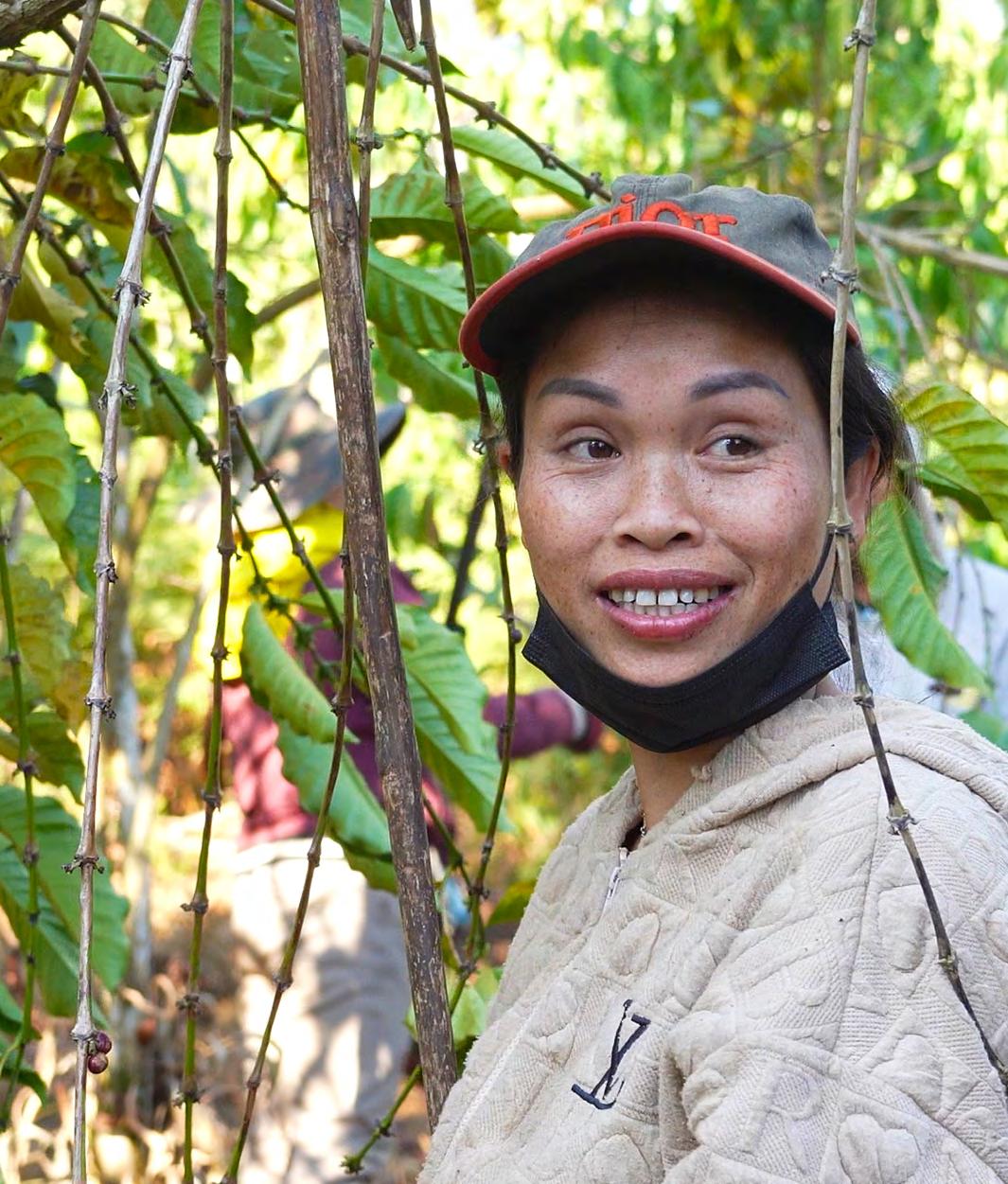
Somphone Sengphachan is a member of Coopérative des Producteurs de Café du Plateau des Bolovens in Laos, which has been Fairtrade certified since 2009. As one of more than 600 farmer members, she benefits from better prices, technical support, microfinance loans, organic fertiliser production, and more. Watch
Fairtrade International 12
Somphone Sengphachan
2. Growth and innovation
Our ambition: We will strengthen existing relationships, develop Fairtrade markets in new directions, and offer supply chain services that benefit everyone – fairly and sustainably.
Expanding Fairtrade sourcing and services
As part of generating more opportunities for Fairtrade producers, we test new approaches that aim to make it easier for companies to create or market new Fairtrade products, and add new benefits.
For instance, Fairtrade Germany and toom Baumarkt, a home and garden improvement retailer, developed a project to expand toom’s Fairtrade plant offerings in other seasons since they had been selling Fairtrade poinsettias since 2015. Through this pilot, nurseries in Germany and the Netherlands can buy Fairtrade seedlings or cuttings – of dahlias, asters and African daisies, for instance – and cultivate them to a finished state alongside non-Fairtrade plants. Only the quantity that the nurseries buy as Fairtrade can be sold as Fairtrade, which is verified by FLOCERT. In addition to the regular Fairtrade Premium, toom Baumarkt pays an extra one euro cent per Fairtrade plant to a wage fund for the Fairtrade workers in Ethiopia, Kenya, Uganda and Costa Rica.
Another kind of pilot project expands Fairtrade certification to certain products that are locally grown in European countries, aimed at extending fair prices and conditions for more farmers. Since 2022, for example, French shoppers can find products that contain certified French dairy.
Building market opportunities in producer countries
While Fairtrade remains highly recognised and trusted in European and North American markets, Fairtrade producer networks are supporting producers to develop and market their own brands locally, and raise consumers’ awareness about Fairtrade.
India is a prime example. Through the efforts of Fairtrade India, Fairtrade NAPP and the support of grants, achievements include:
• People in higher socioeconomic groups in metro areas increased their awareness of Fairtrade from 10 to 25 percent between 2019 and 2022.
• Through the four-year SWITCH-Asia grant, more than 235 new sustainable Fairtrade-labelled food, fashion and cosmetics products were launched, and sales of Fairtrade certified cotton products in India increased by over 270 percent.
• The ACCOR Group of hotels opted to source sustainable, Fairtrade certified bath amenities from a local manufacturer, emphasising local ingredients and innovative packaging to minimize plastic waste.
• In 2023, Fairtrade India facilitated a sustainable, Fairtrade certified supply chain for L’Oréal, leading to the launch of sustainable Fairtrade towels for corporate merchandising across India—a pioneering initiative for the company in Asia.
The Added Value Fund, created by CLAC, Fairtrade International and the Interamerican Foundation, has supported 85 organisations to either improve their product quality and product packaging, or to buy equipment to improve their production processes. The funding supported Fairtrade certified cooperative PROEXO to create a new line of coffee produced by women, Café Brisas.
Fairtrade Africa has trained cooperatives in Kenya, Ghana, Côte d’Ivoire and Eswatini on coffee roasting, tea blending, chocolate making, value addition of shea butter, chilies, and honey. The training also included the topics of business management, financial modelling, market planning and business performance management. As of early 2024, there are five tea brands, three chocolate brands, and three coffee brands selling in markets including Kenya, Côte d’Ivoire and Egypt, with more to come. Fairtrade Africa has also fostered sourcing relationships between cooperatives and local retailers such as Greenspoon, Montys and Healthy U in Kenya, and Faithful to Nature and Pick N Pay in South Africa for their own-brand Fairtrade labelled products.
13 Annual Report 2023
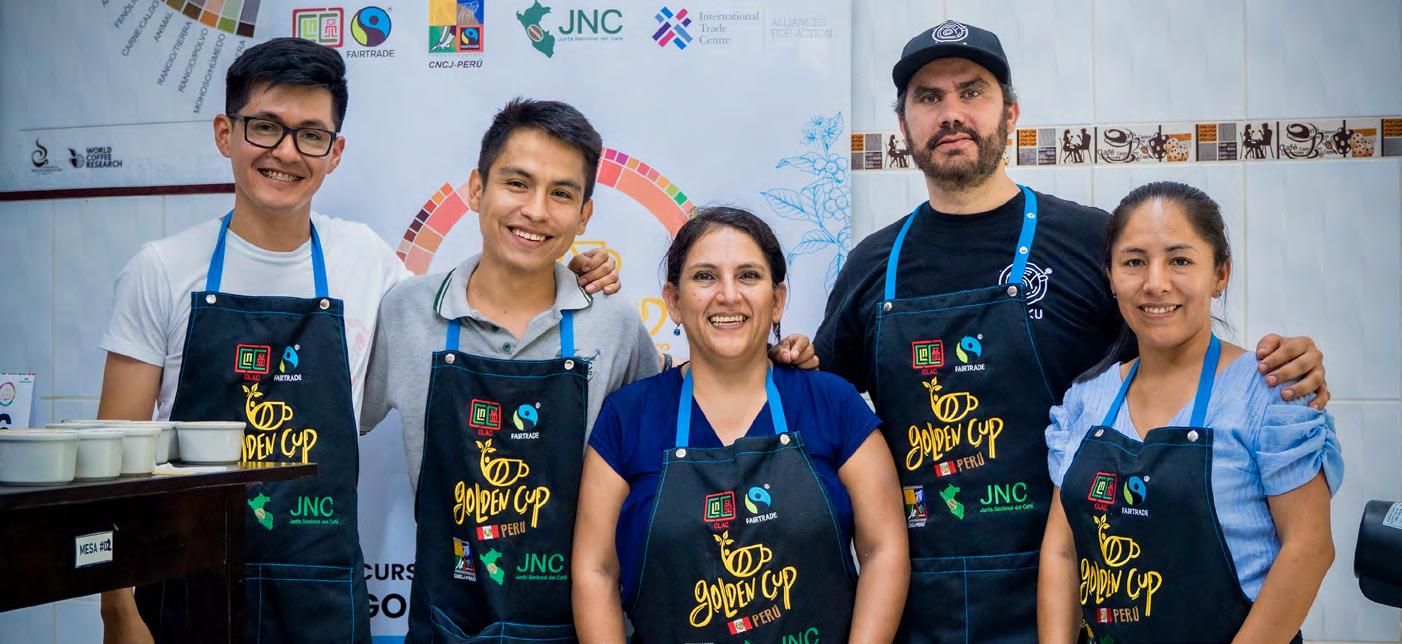
New approaches to sustainability challenges
The challenges facing producers and companies are ultimately similar –higher costs, the effects of climate change, human rights abuses, complying with new legislation, and the uncertain future of young people in farming, to name a few.
Fairtrade works with producers, companies and institutional donors to develop innovative projects, many of which are described in other sections of this report. Here are some that include new ways of partnering or addressing multiple challenges at once.
• We developed a banana impact dashboard as a one-stop-shop for all data and information on Fairtrade bananas. Users can find information about specific origins, as well as Fairtrade Premium amounts and uses, the new Living Wage Reference Prices, research findings, and more. Customised dashboards can be developed for specific supply chain partners.
• The Sustainable Banana project, funded by the French Development Agency and Carrefour, supported five Peruvian and six Dominican banana producer organisations to improve their yields by 19 percent between 2021 and 2023. Eighty percent of participating farmers (up from 42 percent) now integrate climate-friendly practices, and 93 percent now use organic fertiliser and pesticides. Nearly one-third of management
positions in the cooperatives are held by women, and 10 percent by young people.
• In 2023, the French Development Agency partnered with Max Havelaar France and Fairtrade Africa to launch the three-year Ghana Agroforestry for Impact project. This project works with 1,200 Fairtrade cocoa farmers in 20 communities, aiming to convert 100 hectares of monoculture parcels into dynamic agroforestry, enhancing productivity, soil fertility, crop diversification and climate change resilience. It also seeks to increase inclusion of women and young people, and strengthen incomes and household savings.
Through funding from Fairtrade Max Havelaar Switzerland, Fairtrade Finland and the International Trade Centre (ITC), the Fairtrade Coffee Development Plan has supported cooperatives from 23 countries to tackle multiple challenges – from
climate change to market access –with the aim of increasing resilience and incomes for coffee farmers. In Asia Pacific, Fairtrade producer network NAPP is working with 46 coffee cooperatives and more than 6,000 farmers in India, Indonesia, Laos and Vietnam to deliver trainings on topics such as climate resilience, value addition, processing, branding and marketing.
In October, Fairtrade Africa hosted the Fairtrade Global Awards in Nairobi, featuring eight awards categories celebrating excellence in ethical and sustainable trade practices on the part of traders and companies, from climate action to living wages and income.
The partner of the year award went to Ben & Jerry’s, for excellence and strong commitments above and beyond Fairtrade certification, strong relationships with producer groups, and testing new approaches with Fairtrade.
Businesses have the potential to be remarkable agents of positive change. Let us use their stories as a source of inspiration, a testament to what’s possible, and a call to action for others to follow suit in the pursuit of a more sustainable world.”
Sandra Uwera Murasa, Global CEO of Fairtrade International, at the 2023 Fairtrade Global Awards
Fairtrade International 14
Ten Fairtrade Golden Cup competitions in 2023 showcased the high quality coffees produced by Fairtrade farmers and help them to find new buyers. Some participants in the Peru Golden Cup competition (left to right): Jefer Guzmán, Carlos Altez, Ana Salazar, Luko Saric, Elisa Hinojosa.
Fairtrade Standards and Minimum Price updates in 2023
Fairtrade Standards and prices are regularly reviewed to better meet the needs of producers and companies. Announcements are public on our website
Some of the significant changes in 2023 include:
• The new Fairtrade Minimum Price and organic differential for coffee took effect for contracts as of 1 August 2023, reflecting analysis of costs of sustainable production and consultation with 540 entities.
• The Fairtrade Minimum Price for bananas was updated in October 2023, alongside the launch of a new Living Wage Reference Price. We updated the methodologies for calculating base wages for bananas and floor wages for other fresh fruit.
• Our Cocoa Standard added additional requirements on Internal Management Systems and risk management.
• Our Coffee Standard now includes ten requirements to monitor risk and prevent deforestation and manage biodiversity, which were announced in early 2024.
• We held consultations on adding HREDD requirements to the Fairtrade Hired Labour Standard and Trader Standard. The updated standards were launched in early 2024.
• The Fairtrade Standard for Smallscale Producer Organisations was updated with 14 requirements on working conditions and occupational health and safety that are more broadly applicable to workers hired by producer organisations or farmer members.
• Our Flowers and Plants Standard was updated with additional requirements, for instance on Fairtrade Premium use, environmental protection, retro-certification, and new bouquet composition rules.
• We updated our methodology for collecting cost of sustainable production data for setting Fairtrade Minimum Prices, and began collecting cocoa cost data. We announced new Fairtrade Minimum Prices and Premiums for organic hazelnuts from Georgia and organic rice from Sri Lanka.
15 Annual Report 2023
3. Advocacy and citizen engagement
Our ambition: We will champion change that addresses human rights risks, climate change, inequality, and power imbalances in supply chains.
Ensuring sustainability legislation reflects producers’ priorities
Several regulations in the European Union became more concrete in 2023, and were stronger thanks to advocacy by Fairtrade producers and partners. The European Union Deforestation Regulation (EUDR) entered into force in June 2023, and we are working to influence implementation of the regulation, for instance by calling for more research into the effects on smallholder coffee and cocoa farmers. Read more about our support to producers related to the EUDR on page 9.
The EU Corporate Sustainability Due Diligence Directive (CSDDD) was strengthened in late 2023, as elements important to Fairtrade and our partners
were added: reference to the right to a living income and living wage; and requirements for meaningful stakeholder engagement, responsible disengagement, and the obligation to address purchasing practices. Although some provisions were weakened during the recent passage of the directive earlier this year, it still achieves a common framework for EU companies.
We were also proud to see the results of years of work related to an EU competition law. Guidelines accompanying the law were adjusted to include a whole chapter on sustainability, mentioning living incomes, living wages and other social aspects.

Together with the World Fair Trade Organisation and the Fair Trade Advocacy Office, we are calling for the European Green Deal to become a Global Green Deal, so that Europeans take more responsibility for the impact of goods produced elsewhere for European consumption. This work started in 2023 and continues in 2024.
We organised public sessions on gender equality in global supply chains, and the role of voluntary sustainability schemes to adjust to EU legislation. We also influenced EU directives aimed at addressing greenwashing: the Empowering Consumers Directive adopted at the end of 2023, and the Green Claims Directive, proposed in early 2023 and which will be adopted at the end of 2024.
Producer advocacy
Through the European Commission Framework Partnership Agreement grant, Fairtrade International launched a programme for farmers between the ages of roughly 20 and 35 to build their skills as leaders, communicators and advocates. These 25 Fairtrade ambassadors – 48 percent of them women – participated in a high-level talks with EU policy makers and at global events.
The same grant also supported each of the three Fairtrade producer networks to develop a regional advocacy strategy. Fairtrade NAPP in the Asia Pacific
Fairtrade International 16
Fairtrade cocoa farmer Deborah Osei Mensah speaks at the first producer led cocoa living income summit, hosted by Fairtrade in Abidjan, Côte d’Ivoire, in May 2023.
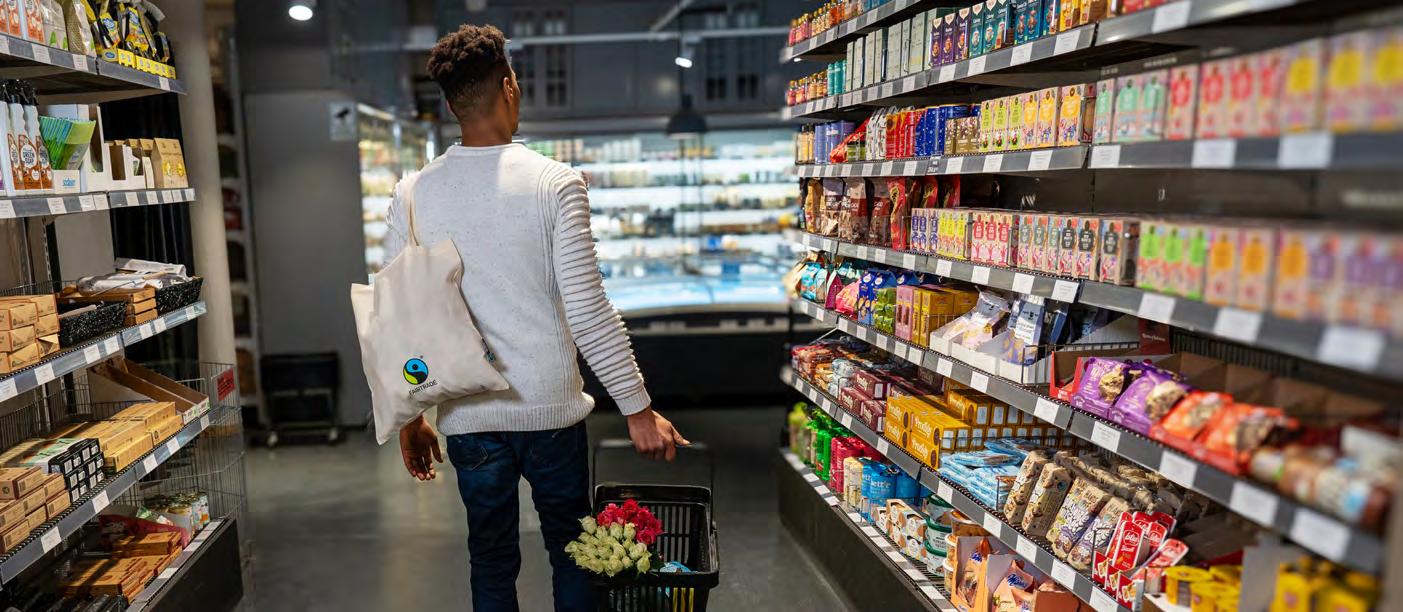
Fairtrade campaigns raise awareness of the importance of everyday shopping choices.
Engaging citizens
region selected five countries to focus on in the next few years. Fairtrade Africa developed advocacy priorities bottom-up from their country networks and based on major product areas. In Latin America and the Caribbean, CLAC is working through national platforms to influence relevant legislation.
Climate resilience and environment in the spotlight
A delegation of Fairtrade farmers and other experts attended COP28 in Dubai, seeking to focus attention on the urgency of climate solutions for agricultural communities. The event included a day on food and agriculture, and more than 130 countries signed a declaration on sustainable agriculture. Ana Laura Sayago, a Fairtrade organic honey producer in Argentina and a Fairtrade ambassador, spoke at the plenary session. We co-organised two side-events addressing the role of young people, and a farmer-centric approach to market creation and standard setting for carbon and nature, and spoke at 12 other events. We also organised a demonstration of farmers, together with the Farmers’ Constituency.
In line with the launch of our sustainable agriculture policy in July, we are dialling up our advocacy for policies that support agroforestry and raise the bar for sustainable production and consumption. See page 9 for more.
Campaigns raise awareness about what Fairtrade is, increase demand for more sustainable goods, and spur citizens to take action.
In 2023, Fairtrade Max Havelaar Switzerland, Fairtrade Austria and Fairtrade Denmark turned February into “Fairbruary”, encouraging shoppers to try new Fairtrade products during the month. In Switzerland alone, around 5.6 million people saw billboards, materials and social media content as part of the campaign.
During the UK’s Fairtrade Fortnight, the Fairtrade Foundation built an immersive “endangered aisle” pop-up shop in London that allowed citizens to understand how climate change threatens some favourite products and farmers’ livelihoods, and how shopping choices can make a difference. The Foundation hosted seven online events, and Fairtrade supporters held more than 600 local events.
We continued to promote the Good Clothes, Fair Pay campaign, started in 2022and calling for the European Union to adopt legislation requiring companies selling textiles and garments in Europe to ensure that workers in their supply chains earn a living wage. More than 240,000 citizens signed the petition, and more than 50 European NGOs and trade unions mobilised for the campaign.
Fair Trade Towns and Fairtrade schools and universities continue to expand as places for engaged citizens to celebrate, learn, and advocate within their schools or local governments to support sustainable consumption, today and for future generations.
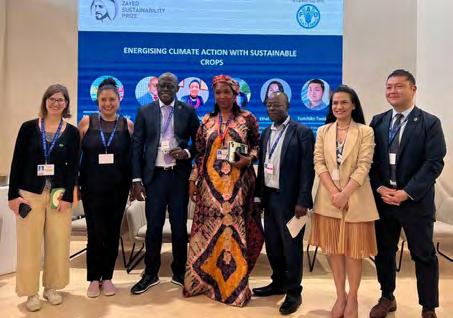
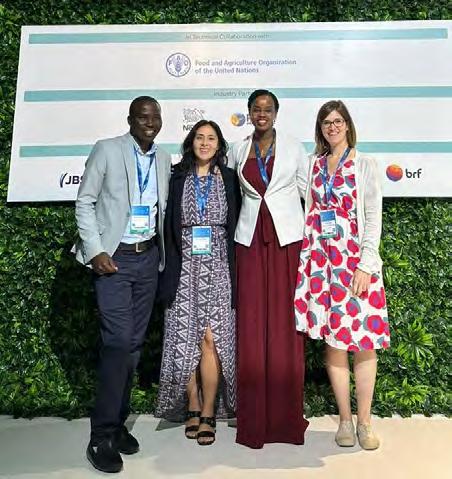
Members of the Fairtrade delegation spoke at 15 different events at the COP28 climate conference.
17 Annual Report 2023
4. Digitalisation for fairer supply chains
Our ambition: We will unlock the power of fair supply chains through data, transparency and traceability.
The power informationof to drive sustainability
Access to data is essential in today’s marketplace. From information to comply with regulations, to the ability to trace a product from farm to shelf, to impact stories – everyone needs the right information at the right time. There is a data component to everything mentioned in this report.
Our Digital Data and Information strategy, adopted in 2022, guides our progress toward robust systems that respect producer ownership of data, and also meet next-generation market demands and opportunities.
FairInsight: Producer information with one click
FairInsight is our platform for producers to share information with trade partners. The Fairtrade producer networks train and support producer organisations to upload data to FairInsight and use it to strengthen their trade relationships.
By the end of 2023, nearly one in four producer organisations had reported their Fairtrade Premium plans and expenditures into FairInsight, which is the first functionality available.
The next phase in development will allow producer organisations to add detailed information about products to generate a commercial profile to share with potential buyers, among other
features, which will simplify reporting for producers and centralise information that they can choose how to share.
FairMarket: Traceability for supply chain partners
In 2023, we developed a user-friendly traceability solution that we tested with coffee, using existing data from the enterprise resource management systems of other supply chain actors. This approach aims to minimise the data reporting burden, while facilitating two-way transparency: enabling companies to trace product origins, and also allowing cooperatives to track their products’ final destinations.
We are transitioning from a pilot phase to a full rollout for all Fairtrade coffee, and we plan to extend this approach to Fairtrade banana and cocoa supply chains.
Other 2023 highlights include:
• Expansion of an impact map that highlights more than 100 current and recent Fairtrade projects and studies around the world, plus country-level producer data, filterable by product, topic, and keyword.
• Funded by the Equité 2 programme of the French Development Agency and French Facility for Global Environment, Fairtrade Africa and Max
Havelaar France supported 25 cooperatives to set up Internal Management Systems to improve their data management, internal governance, risk reduction and social responsibility. By the end of the three-year project, all participating cooperatives had shifted to digital data collection and storage. About two-thirds of the cooperatives were able to analyse their own data and make datainformed decisions at their general assemblies.
• Launch of a partnership with Satelligence to scale up deforestation monitoring and risk assessment for Fairtrade cocoa and coffee cooperatives (see page 9).
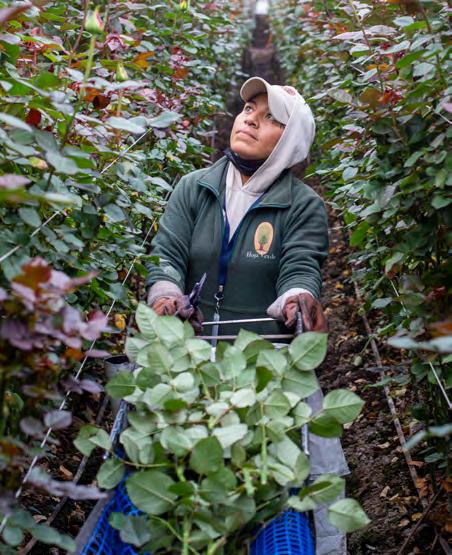
Fairtrade International 18
Watch
Maria Laura Salazar works at Hoja Verde flower producer in Ecuador, Fairtrade certified since 2000.
Partnerships that drive impact
Fairtrade’s partnerships with governments, development agencies, businesses, research institutes and civil society organisations support producer organisations to deepen their skills, test new ideas, and accelerate change.
Our newly expanded interactive impact map showcases projects ranging from improving the rights of workers on South African wine grape farms to responsible gold mining in Peru. In total, 56 externally funded Fairtrade projects across the Fairtrade system were active in 2023 including 10 funded by businesses, 29 by institutional grants and 17 by both.
Fairtrade International’s partnerships
Financial support from the European Commission (EC) made it possible for Fairtrade International to strengthen our system and build support for fair trade globally.
One of these was through the EC’s Framework Partnership Agreement, called Unlocking the Power of Producers and Workers to Drive Inclusive Trade and Development through Fairtrade (2019-2023). This multi-stakeholder project supported Fairtrade’s strategic priorities in strengthening governance; promoting inclusion and efficiency; and building our collective capacities in policy advocacy, including through research and producers’ involvement in highlevel discussions (such as the UN COP28). Twenty-five young farmers became “Fairtrade ambassadors” through a training programme that developed public speaking and communications skills. A follow-on grant (2024-2027) has already begun to further advance EU policy objectives and support producer organisations in contributing to the Sustainable Development Goals.
The EC-funded SWITCHAsia grant, Switching to Green and Fair Fashion (2023-2026), builds on the successful first SWITCH-Asia grant (2018-2022), to promote the adoption of sustainable production in India’s cotton textiles sector. Among other things the first grant resulted in a network of more than 100 Indian sustainability-minded institutions and businesses.
Fairtrade International also implemented an emergency relief and resilience fund aimed at mitigating the cost of living crisis (2023-2024), with the financial support of the German Federal Ministry for Economic Cooperation and Development (BMZ). The main objective of the project was to build the resilience of agricultural production systems against future shocks
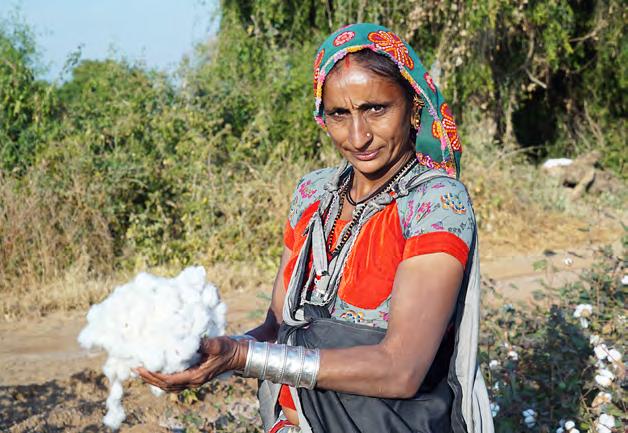
Shantiben Navinbhai Makwana, member of Rapar and Dhrangadhra Farmers Producer Company in India, harvests her cotton. Watch
and stresses caused by spiralling food, energy and finance costs, by investing in resilient food systems that protect smallholder producers and workers.
In addition, Fairtrade International established new and reinforced strategic alliances with:
• International Trade Centre (ITC), the joint agency of the World Trade Organisation and the United Nations: to support producers to make progress toward the Sustainable Development Goals and access new markets.
• Satelligence: to scale up deforestation monitoring and risk assessment for Fairtrade cocoa and coffee producer organisations (see page 9).
• United Nations Industrial Development Organisation (UNIDO): to support producers with implementation of human rights and environmental due diligence, transition to agroecology, market access, and more.
• MPS, the Dutch certification scheme for the horticulture sector that focuses on environmental footprinting and environmental data exchange: to implement a joint project reviewing banned active substances and exploration of combined audits in the future.
A full list of Fairtrade International funders and partners can be found on our website
19 Annual Report 2023
Fairtrade International’s financials
Statement of Accounts for 2023
The summarised key financial figures outlined below have been extracted from internal management reports and from the audited financial statements for 2023. The latter, as in previous years, received an unqualified opinion (DHPG). Fairtrade International’s accounting practices comply with generally accepted accounting practices and relevant German legislation (HGB).
Income
10% Sales
9% Contributions and donations
Expenditure
7% Monitoring and evaluation (Global Impact)
6% Standardsetting and pricing
12% Product management, programmes, policy
14% Brand, communications, fundraising and advocacy
81% Membership fees
Membership fees: As a membership organisation, Fairtrade International receives membership fees from the national Fairtrade organisations (NFOs), which receive fees from companies that license the FAIRTRADE Mark for use on their products. The membership fee is unrestricted funding and is calculated as a percentage of the license fee income of each NFO.
Sales: This includes income from cross-border sales and international licensing.
Contributions and donations: This includes grant funding.
41% Funding to producer networks
14% Governance and global resources
6% Other
Funding to producer networks: Three
Fairtrade producer networks receive this funding to provide support services to producers in their regions.
Product management, programmes and policy: This includes costs associated with personnel related to these functions.
Brand, communications, fundraising and advocacy: This includes some grant pass-through funds to partners (€0.8 million), in addition to personnel related to these functions.
Governance and global resources: This includes costs associated with the Board and General Assembly, as well as for finance, IT, human resources, legal services, and international licensing functions.
Fairtrade International 20
Income Statement
Balance Sheet 2022 (€’000)
Fairtrade International’s institutional funding partners in 2023
European Union – Framework Partnership Agreement and SWITCH-Asia programme
German Federal Ministry of Economic Cooperation and Development (BMZ)
German Agency for International Cooperation (GIZ)
Additional institutional funding partners to the Fairtrade global system in 2023
Australian Department of Foreign Affairs and Trade
Beyond Beans Foundation
Belgian Directorate-General for Development Cooperation and Humanitarian Aid
Co-op Foundation (UK)
Engagement Global - Service für Entwicklungsinitiativen (Service for Development Initiatives)
European Partnership for Responsible Minerals
French Development Agency (AFD)
German Federal Ministry of Economic Cooperation and Development (BMZ)
German Agency for International Cooperation (GIZ)
International Trade Center (ITC)
Italian Buddhist Union
Ministry for Foreign Affairs of Finland
New Zealand Ministry of Foreign Affairs and Trade
Norwegian Agency for Development Cooperation (NORAD)
Swiss Platform for Sustainable Cocoa
Swiss State Secretariat for Economic Affairs (SECO)
Veneto Region, Italy
Waterloo Foundation
31.12.2023 31.12.2022 Fixed Assets 1,373 1,348 Intangible fixed assets 13 5 Tangible fixed assets 197 180 Financial assets 1,163 1,163 Current assets 12,062 15,505 Receivables 5,339 7,554 Other assets 208 470 Liquid funds 6,515 7,481 Prepaid expenses 140 225 TOTAL 13,575 17,078 31.12.2023 31.12.2022 Equity 10,313 9,521 Restricted and designated reserves 3,101 1,088 General reserve 4,762 4,833 Net income for the year 2,450 3,600 Provisions 486 3,655 Liabilities 2,735 3,902 For supplies and services 1,796 1,987 Other liabilites and accruals 939 1,915 Deferred income 41 0 TOTAL 13,575 17,078 21 Annual Report 2023
2023 (€’000) 2022 (€’000) Total income 31,784 31,067 Total expenditure 31,220 30,602 Income from investments 531 750 Taxes on income 387 338 Earnings after taxes 708 877 Profit carried forward 3,600 2,264 Changes in reserves -1,858 458 Retained earnings 2,450 3,599
Fairtrade International Board of Directors 2023
The international Fairtrade system is governed by the General Assembly and an elected Board of Directors (shown below as of 31 December 2023).

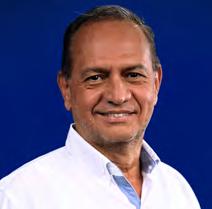


Laurence Tanty Chair (National Fairtrade organisation representative)

Miguel Ángel Munguía Gil Vice-Chair (Producer representative)

Rhea Beltrami (National Fairtrade organisation representative)

Andrea Debbané (National Fairtrade organisation representative)

Pravakar Meher (Producer representative)

Bill Barrett Vice-Chair (National Fairtrade organisation representative)
Frank Harnischfeger Treasurer (Independent)
Wambui Chege (Independent)
Kouame N’dri BenjaminFrancklin (Producer representative)
Merling Preza Ramos (Producer representative)
Fairtrade International 22
Biodiversity is important –with it come animals that fertilise the soil, which benefits the plantation and protects it at the same time. In a diverse environment, one species does not thrive at the expense of the others.”
Balbino Reyes Rosales
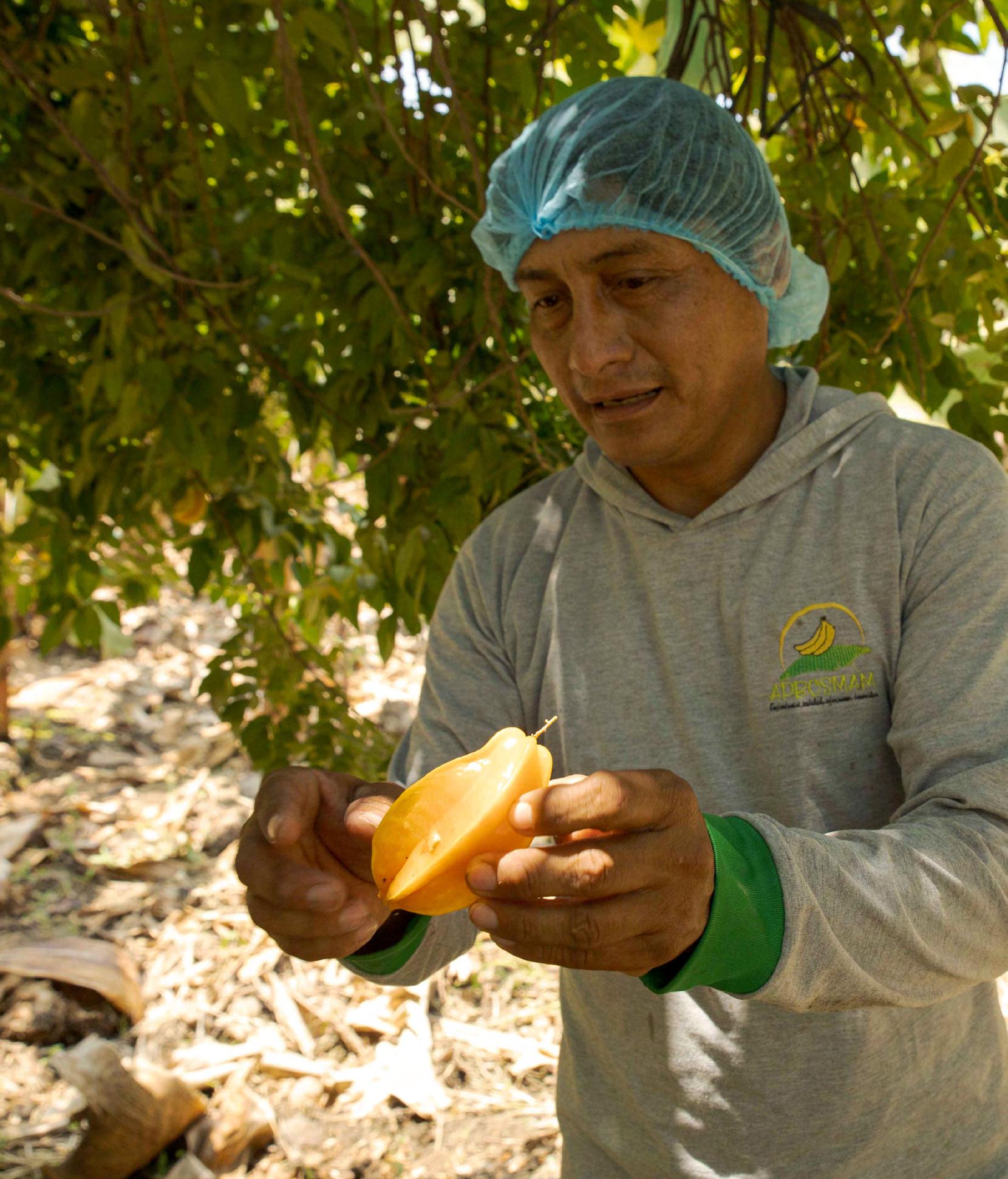
Balbino Reyes Rosales is an agronomist for Fairtrade certified banana cooperative APBOSMAM in Peru. To make their soil more pest and disease resilient, farmers plant a variety of trees and plants alongside the banana trees to boost biodiversity, such as coconut, chili peppers, oranges, mangoes and legumes. The cooperative has used its Fairtrade Premium to invest in organic fertiliser production, among other things.
23 Annual Report 2023
Fairtrade International Bonner Talweg 177 53129 Bonn Germany Telephone +49 (0) 228 94 92 30 Fax +49 (0) 228 24 21 713 info@fairtrade.net www.fairtrade.net
Follow us at ‘Fairtrade International’ on
Disclaimer
Data in this report were collected through various monitoring and data collection systems within Fairtrade, reported in some cases by producer organisations through the audit process and in other cases by other supply chain actors. Fairtrade International is not responsible for the accuracy of the data. The report has been compiled to the best of our knowledge and is provided for informational purposes only. Fairtrade International reserves the right to update the data as new information becomes available. The data are provided “as is” and no warranty of any kind is given for the accuracy and reliability of the data. Fairtrade International will not be liable for any claims or damages related to the quality and completeness of the data, as far as it is permitted under law.
Credits
Photos: Rosa Panggabean (cover), Carlos Gasparotto / Teresa Iarapoli (p. 2), Zamira Ramírez / Sergio Calderón (p. 8), Fairtrade NAPP (p. 9), Lubomír Kadaně (p. 10), Fairtrade Africa (p. 11), Fairtrade NAPP (p. 12), Kevin Rosales (p. 14), Fairtrade Belgium / Kamil Hammenecker (p. 16), Fairtrade Sweden (p. 17 top), Fairtrade International (p. 17 bottom), Iñaqui Mantz / Martín Jaramillo (p. 18), Fairtrade NAPP (p. 19), Andrej Barát (p. 23) · Layout: Dreimalig, Cologne


























